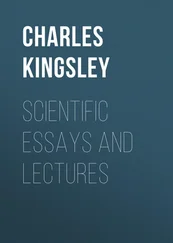Charles Kingsley - Alexandria and Her Schools
Здесь есть возможность читать онлайн «Charles Kingsley - Alexandria and Her Schools» — ознакомительный отрывок электронной книги совершенно бесплатно, а после прочтения отрывка купить полную версию. В некоторых случаях можно слушать аудио, скачать через торрент в формате fb2 и присутствует краткое содержание. Жанр: foreign_antique, Философия, foreign_edu, на английском языке. Описание произведения, (предисловие) а так же отзывы посетителей доступны на портале библиотеки ЛибКат.
- Название:Alexandria and Her Schools
- Автор:
- Жанр:
- Год:неизвестен
- ISBN:нет данных
- Рейтинг книги:5 / 5. Голосов: 1
-
Избранное:Добавить в избранное
- Отзывы:
-
Ваша оценка:
- 100
- 1
- 2
- 3
- 4
- 5
Alexandria and Her Schools: краткое содержание, описание и аннотация
Предлагаем к чтению аннотацию, описание, краткое содержание или предисловие (зависит от того, что написал сам автор книги «Alexandria and Her Schools»). Если вы не нашли необходимую информацию о книге — напишите в комментариях, мы постараемся отыскать её.
Alexandria and Her Schools — читать онлайн ознакомительный отрывок
Ниже представлен текст книги, разбитый по страницам. Система сохранения места последней прочитанной страницы, позволяет с удобством читать онлайн бесплатно книгу «Alexandria and Her Schools», без необходимости каждый раз заново искать на чём Вы остановились. Поставьте закладку, и сможете в любой момент перейти на страницу, на которой закончили чтение.
Интервал:
Закладка:
Four men only among them seem, as far as I can judge, to have had a great inductive power: Socrates and Plato in Metaphysics; Archimedes and Hipparchus in Physics. But these men ran so far counter to the national genius, that their examples were not followed. As you will hear presently, the discoveries of Archimedes and Hipparchus were allowed to remain where they were for centuries. The Dialectic of Plato and Socrates was degraded into a mere art for making anything appear alternately true and false, and among the Megaric school, for undermining the ground of all science, and paving the way for scepticism, by denying the natural world to be the object of certain knowledge. The only element of Plato’s thought to which they clung was, as we shall find from the Neoplatonists, his physical speculations; in which, deserting his inductive method, he has fallen below himself into the popular cacoethes, and Pythagorean deductive dreams about the mysterious powers of numbers, and of the regular solids.
Such a people, when they took to studying physical science, would be, and in fact were, incapable of Chemistry, Geognosy, Comparative Anatomy, or any of that noble choir of sister sciences, which are now building up the material as well as the intellectual glory of Britain.
To Astronomy, on the other hand, the pupils of Euclid turned naturally, as to the science which required the greatest amount of their favourite geometry: but even that they were content to let pass from its inductive to its deductive stage—not as we have done now, after two centuries of inductive search for the true laws, and their final discovery by Kepler and Newton: but as soon as Hipparchus had propounded any theory which would do instead of the true laws, content there to stop their experiments, and return to their favourite work of commenting, deducing, spinning notion out of notion, ad infinitum .
Still, they were not all of this temper. Had they been, they would have discovered, not merely a little, but absolutely nothing. For after all, if we will consider, induction being the right path to knowledge, every man, whether he knows it or not, uses induction, more or less, by the mere fact of his having a human reason, and knowing anything at all; as M. Jourdain talked prose all his life without being aware of it.
Aristarchus is principally famous for his attempt to discover the distance of the sun as compared with that of the moon. His method was ingenious enough, but too rough for success, as it depended principally on the belief that the line bounding the bright part of the moon was an exact straight line. The result was of course erroneous. He concluded that the sun was 18 times as far as the moon, and not, as we now know, 400; but his conclusion, like his conception of the vast extent of the sphere of the fixed stars, was far enough in advance of the popular doctrine to subject him, according to Plutarch, to a charge of impiety.
Eratosthenes, again, contributed his mite to the treasure of human science—his one mite; and yet by that he is better known than by all the volumes which he seems to have poured out, on Ethics, Chronology, Criticism on the Old Attic Comedy, and what not, spun out of his weary brain during a long life of research and meditation. They have all perished,—like ninety-nine hundredths of the labours of that great literary age; and perhaps the world is no poorer for the loss. But one thing, which he attempted on a sound and practical philosophic method, stands, and will stand for ever. And after all, is not that enough to have lived for? to have found out one true thing, and, therefore, one imperishable thing, in one’s life? If each one of us could but say when he died: “This one thing I have found out; this one thing I have proved to be possible; this one eternal fact I have rescued from Hela, the realm of the formless and unknown,” how rich one such generation might make the world for ever!
But such is not the appointed method. The finders are few and far between, because the true seekers are few and far between; and a whole generation has often nothing to show for its existence but one solitary gem which some one man—often unnoticed in his time—has picked up for them, and so given them “a local habitation and a name.”
Eratosthenes had heard that in Syene, in Upper Egypt, deep wells were enlightened to the bottom on the day of the summer solstice, and that vertical objects cast no shadows.
He had before suggested, as is supposed, to Ptolemy Euergetes, to make him the two great copper armillæ, or circles for determining the equinox, which stood for centuries in “that which is called the Square Porch”—probably somewhere in the Museum. By these he had calculated the obliquity of the ecliptic, closely enough to serve for a thousand years after. That was one work done. But what had the Syene shadows to do with that? Syene must be under that ecliptic. On the edge of it. In short, just under the tropic. Now he had ascertained exactly the latitude of one place on the earth’s surface. He had his known point from whence to start on a world-journey, and he would use it; he would calculate the circumference of the earth—and he did it. By observations made at Alexandria, he ascertained its latitude compared with that of Syene; and so ascertained what proportion to the whole circumference was borne by the 5000 stadia between Alexandria and Syene. He fell into an error, by supposing Alexandria and Syene to be under the same meridians of longitude: but that did not prevent his arriving at a fair rough result of 252,000 stadia—31,500 Roman miles; considerably too much; but still, before him, I suppose, none knew whether it was 10,000, or 10,000,000. The right method having once been found, nothing remained but to employ it more accurately.
One other great merit of Eratosthenes is, that he first raised Geography to the rank of a science. His Geographica were an organic collection, the first the world had ever seen, of all the travels and books of earth-description heaped together in the Great Library, of which he was for many years the keeper. He began with a geognostic book, touched on the traces of Cataclysms and Change visible on the earth’s surface; followed by two books, one a mathematical book, the other on political geography, and completed by a map—which one would like to see: but—not a trace of all remains, save a few quoted fragments—
We are such stuff
As dreams are made of.
But if Eratosthenes had hold of eternal fact and law on one point, there was a contemporary who had hold of it in more than one. I mean Archimedes; of whom, as I have said, we must speak as of an Alexandrian. It was as a mechanician, rather than as an astronomer, that he gained his reputation. The stories of his Hydraulic Screw, the Great Ship which he built for Hiero, and launched by means of machinery, his crane, his war-engines, above all his somewhat mythical arrangement of mirrors, by which he set fire to ships in the harbour—all these, like the story of his detecting the alloy in Hiero’s crown, while he himself was in the bath, and running home undressed shouting εὕρηκα—all these are schoolboys’ tales. To the thoughtful person it is the method of the man which constitutes his real greatness, that power of insight by which he solved the two great problems of the nature of the lever and of hydrostatic pressure, which form the basis of all static and hydrostatic science to this day. And yet on that very question of the lever the great mind of Aristotle babbles—neither sees the thing itself, nor the way towards seeing it. But since Archimedes spoke, the thing seems self-evident to every schoolboy. There is something to me very solemn in such a fact as this. It brings us down to some of the very deepest questions of metaphysic. This mental insight of which we boast so much, what is it? Is it altogether a process of our own brain and will? If it be, why have so few the power, even among men of power, and they so seldom? If brain alone were what was wanted, what could not Aristotle have discovered? Or is it that no man can see a thing unless God shows it him? Is it that in each separate act of induction, that mysterious and transcendental process which cannot, let logicians try as they will, be expressed by any merely logical formula, Aristotelian or other—is it I say, that in each separate act of induction we do not find the law, but the law is shown to us, by Him who made the law? Bacon thought so. Of that you may find clear proof in his writings. May not Bacon be right? May it not be true that God does in science, as well as in ethics, hide things from the wise and prudent, from the proud, complete, self-contained systematiser like Aristotle, who must needs explain all things in heaven and earth by his own formulæ, and his entelechies and energies, and the rest of the notions which he has made for himself out of his own brain, and then pack each thing away in its proper niche in his great cloud-universe of conceptions? Is it that God hides things from such men many a time, and reveals them to babes, to gentle, affectionate, simple-hearted men, such as we know Archimedes to have been, who do not try to give an explanation for a fact, but feel how awful and divine it is, and wrestle reverently and stedfastly with it, as Jacob with the Angel, and will not let it go, until it bless them? Sure I am, from what I have seen of scientific men, that there is an intimate connection between the health of the moral faculties and the health of the inductive ones; and that the proud, self-conceited, and passionate man will see nothing: perhaps because nothing will be shown him.
Читать дальшеИнтервал:
Закладка:
Похожие книги на «Alexandria and Her Schools»
Представляем Вашему вниманию похожие книги на «Alexandria and Her Schools» списком для выбора. Мы отобрали схожую по названию и смыслу литературу в надежде предоставить читателям больше вариантов отыскать новые, интересные, ещё непрочитанные произведения.
Обсуждение, отзывы о книге «Alexandria and Her Schools» и просто собственные мнения читателей. Оставьте ваши комментарии, напишите, что Вы думаете о произведении, его смысле или главных героях. Укажите что конкретно понравилось, а что нет, и почему Вы так считаете.












